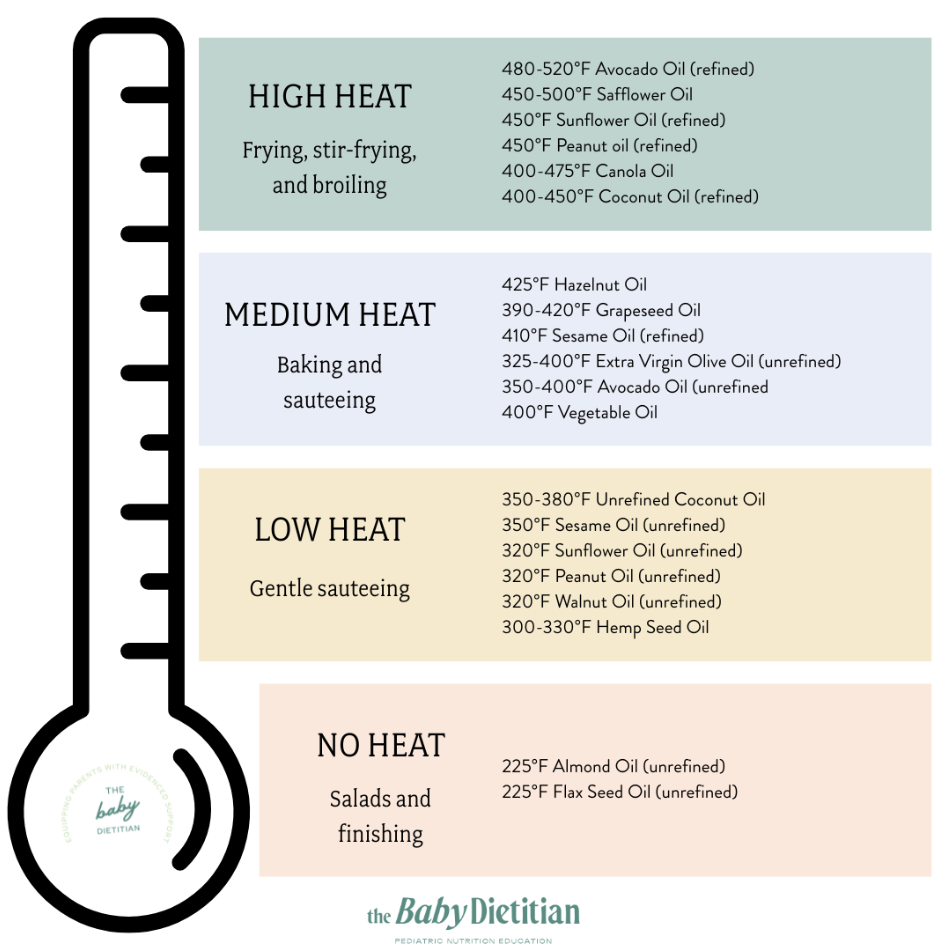


Everything You Need To Know About Seed Oils
Introduction
Seed oils have become a hot topic in the world of nutrition, especially among concerned parents who want to make the best choices for their children. With all the increasing chatter on social media about seed oils from all different sources, it’s understandable to feel confused. As pediatric dietitians, we want to offer a balanced, science-backed perspective on seed oils and how they fit into a healthy diet for kids.
What Are Seed Oils?
Seed oils are vegetable oils extracted from the seeds of certain plants [1]. Common examples include:
- Soybean oil
- Sunflower oil
- Safflower oil
- Canola oil
- Corn oil
- Grapeseed oil
- Cottonseed oil
These seed oils are found in a wide range of everyday foods, especially packaged snacks, baked goods, salad dressings, and many restaurant meals. They became popular in the mid-20th century due to their low saturated fat content, long shelf life, and versatility in cooking.
Nutritional Profile of Seed Oils
Seed oils are primarily composed of polyunsaturated fats, particularly omega-6 fatty acids (6). They tend to be low in saturated fat and are often a source of vitamin E (an antioxidant). While cold-pressed oils retain more nutrients, most commercial seed oils are refined for stability and flavor neutrality.
The Role of Omega-6 and Omega-3 in the Body
Omega-6 and omega-3 fatty acids are both essential fats, meaning our bodies can’t make them; we must get them from food. Omega-6s play a role in growth, immune function, and skin health. Omega-3s support brain development, eye health, and have anti-inflammatory properties. The big thing we want you to note here is that omega-6’s are necessary in the diet!
Our modern diets often contain too many omega-6s, and not enough omega-3s. The concern is not about omega-6s being “bad,” but rather that this imbalance has been shown to contribute to inflammation and chronic disease risk (6). It’s not about eliminating omega-6s; it’s about increasing omega-3s.
What Does the Research Say?
Current scientific research does not support the claim that seed oils are harmful when consumed in moderation as part of a varied and balanced diet.
Multiple large-scale, longitudinal studies have shown that replacing saturated fats with polyunsaturated fats (including from plant oils) can lead to significant reductions in cardiovascular disease (CVD) risk. For example, a meta-analysis published in the Journal of the American Heart Association found that substituting just 5% of energy from saturated fat with PUFAs reduced coronary heart disease risk by 10%–25% [3].
There is some concern among the public and certain media outlets regarding the stability of seed oils when heated, due to the potential for oxidation and the formation of harmful compounds such as aldehydes.
While it is true that improper storage or repeated high-heat frying can increase oxidation, studies show that when used appropriately, these oils remain stable and safe for consumption. However, this is not the case for all oils. For example, olive oil should not be used when cooking with high heat, but avocado oil can be used. A chart has been attached below. Moreover, the human body has robust antioxidant systems that help manage small amounts of oxidized lipids, especially when paired with a diet rich in fruits, vegetables, and other antioxidants [2].

While research in pediatric populations is more limited, expert consensus supports a varied diet focused on whole foods, and the moderate inclusion of seed oils is not considered problematic. The American Academy of Pediatrics (AAP) emphasizes that dietary fat is vital for children under two years of age, and that unsaturated fats should make up the majority of fat intake after infancy [5].
Furthermore, major health organizations such as the American Heart Association (AHA), the World Health Organization (WHO), and the Dietary Guidelines for Americans consistently recommend the inclusion of unsaturated fats to reduce the risk of chronic diseases. The AHA specifically encourages choosing cooking oils with more unsaturated fats and fewer saturated fats to support cardiovascular health [4]. The key here is to ensure that the unsaturated fats are rich in omega-3 fatty acids and not just omega 6 fatty acids.
While ongoing research will continue to refine our understanding, particularly around cooking methods, oxidation, and long-term outcomes- there is currently no strong evidence to justify the full elimination of seed oils from the diet, especially when consumed in moderation and as part of an overall nutritious eating pattern. Remember, the primary concern around seed oils is their high omega-6 content, which tends to be disproportionately high in the typical American diet compared to omega-3 intake.
Practical Tips for Families
- Focus on overall dietary patterns. Prioritize whole, minimally processed foods when possible.
- Include a variety of healthy fat sources: olive oil, avocado, nuts, seeds, fatty fish, and yes, even some seed oils can fit in here.
- Use seed oils in moderation. They can be useful for baking, sautéing, and making homemade dressings.
- Reduce intake of ultra-processed foods not just because of seed oils, but due to added sugars, sodium, and preservatives.
Conclusion
Seed oils are not something to fear. While it’s wise to be mindful of the types and amounts of fat in your child’s diet, completely eliminating seed oils is not necessary or evidence-based.
Fat is essential for children’s growth, brain development, and energy needs. Instead of obsessing over every ingredient label, focus on whole foods and what you can add to your child’s diet: more fruits, vegetables, fiber, and diverse fat sources. The goal is to include a variety of high-quality fat sources, rather than focusing solely on what to eliminate.
As with most things in nutrition, moderation and balance are key. Focus on nourishing your child with a wide variety of whole foods, and the rest will fall into place!
2- https://pmc.ncbi.nlm.nih.gov/articles/PMC10178358/
3- Li, Y., Hruby, A., Bernstein, A. M., et al. (2015). Saturated fats compared with unsaturated fats and sources of carbohydrates in relation to risk of coronary heart disease: A prospective cohort study. JAMA Internal Medicine, 175(9), 1320–1329.
4- Karupaiah, T., & Sundram, K. (2007). Effects of stereospecific positioning of fatty acids in triacylglycerol structures in native and randomized fats: A review of their nutritional implications. Nutrition & Metabolism, 4(1), 16.
5- American Academy of Pediatrics. (2014). Pediatric Nutrition Handbook, 7th edition. Elk Grove Village, IL.
6- DiNicolantonio, J. J., & O’Keefe, J. H. (2018). Omega-6 vegetable oils as a driver of coronary heart disease: the oxidized linoleic acid hypothesis. Open heart, 5(2), e000898. https://doi.org/10.1136/openhrt-2018-000898
Want more? My course is a 100% evidence-based approach to starting solids in a way that encourages a healthy dietary pattern from the start.
Check out the Starting Solids 101 Course now!
Access Course Now

Cinthia Scott is a Registered Dietitian (RD) and International Board Certified Lactation Consultant (IBCLC) with over 10 years experience in the field of dietetics. Cinthia focuses on ensuring optimal nutrition in the first 1000 days of life to ensure optimal growth and development as well as set the stage for long-term health. Cindy is an author, starting solids expert, and advocate for caregivers receiving evidence based education and support surrounding breastfeeding and starting solids.
Cinthia is co-author of the 101beforeone Starting Solids Book, “101beforeone -baby-led feeding cookbook,” and is the founder and owner of The Baby Dietitian LLC which is her private practice built to provide virtual 1:1 services for caregivers surrounding infant nutrition, toddler nutrition, and breastfeeding support. Cinthia is also the creator of the Starting Solids 101 Program which provides caregivers 1:1 support from a Pediatric Dietitian on how to provide optimal nutrition from the start and create healthy eating habits that will last their whole lifetime. To work with Cinthia, you can access her services here.
Cinthia provides tons of free information for parents on her social media accounts as well.
- Instagram: @The.Baby.Dietitian
- Tiktok: @The.Baby.Dietitian
